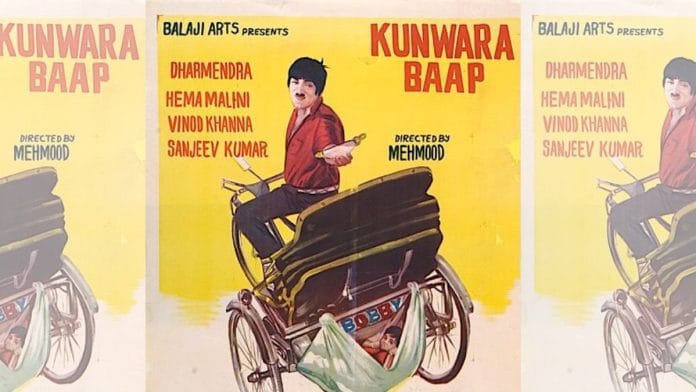An unlikely father-son bond, filled with humour, emotions, and unforgettable music, Mehmood’s 1974 film, Kunwara Baap, is a barrel of laughs–and love. By the time the movie came out, Mehmood had already established himself as the king of comedy, with films such as Padosan, Gumnaam, and Bhoot Bungla.
But Kunwara Baap, where Mehmood plays a rickshaw-puller who finds a baby abandoned by a temple, was closest to his heart for multiple reasons. He is soon diagnosed with polio, and Mehmood’s character, Mahesh, decides to take care of him.
Mehmood made the film – based on Charlie Chaplin’s 1921 film The Kid – to raise awareness about polio, which had affected his son Macky Ali aka Maqdoom Ali (who plays the baby in the film). As the story progresses, the baby grows into a child, portrayed by Mehmood’s other son, singer Lucky Ali. The involvement of his own sons in the project adds a deeply personal layer; the father-son dynamic on-screen seems to mirror their real-life relationship.
Hilarious but tender
Mehmood was famous for his comedic brilliance. But Kunwara Baap pushed him as an actor.
Unlike his usual slapstick roles, the film allowed him to explore a more nuanced character. Mahesh is an irresponsible bachelor who evolves into a loving, responsible father— even though for a brief period–until the child is reunited with his parents.
His portrayal of a man caught between a carefree life and the responsibilities of fatherhood is hilarious yet tender. His comic timing is impeccable, but he also brings a surprising depth to his character, allowing the audience to connect with him on an emotional level.
Mehmood earned a Filmfare nomination for Best Actor in a Comic Role for Kunwara Baap.
When the boy is thrust into his life, Mahesh is compelled to step up. His moral compass won’t allow for anything else, even though he initially tries to rid himself of this responsibility.
But it’s not easy, and the movie shows his confusion and reluctance when life as he knows it is upended. The struggle is raw and real.
One of the most moving moments in the film is when Mahesh attempts to care for the baby he found outside the temple. His lack of experience with children results in a series of hilarious incidents, such as misplacing the baby’s bottle, and struggling to dress him or calm him down.
Kunwara Baap showcases Mehmood’s remarkable physical comedy and his ability to transform mundane situations into funny ones. The film’s primary strength lies in its simplicity. It doesn’t rely on extravagant plots or dramatic twists, focusing instead on the emotional arc of its characters.
The tone shifts from comedy to sentimentality when Mahesh embraces his role as a father–evident as he tenderly comforts the child, no longer seeing him as an inconvenience but as his own flesh and blood. This moment isn’t just about embracing fatherhood; it’s a testament to personal growth, acceptance, and love.
The film has several cameos by some of Bollywood’s biggest names.
Amitabh Bachchan played Anthony, the mechanic; Vinod Khanna played Inspector Ramesh; Sanjeev Kumar played the doctor who diagnosed the child with polio, and Yogeeta Bali played Mahesh’s fake wife. Dharmendra, Hema Malini and Dara Singh played themselves.
Also read: Love, Bombay, middle-class — Basu Chatterjee’s ‘Rajnigandha’ is relevant even today
Newcomer’s luck
Rajesh Roshan’s Music elevates the mood of Kunwara Baap. Mehmood gave a then-18-year-old Roshan his big break as a composer.
Through his music, Roshan not only supported the film’s comedic beats but also elevated its emotional narrative, making the soundtrack an essential part of Kunwara Baap’s timeless appeal. His melody perfectly matches the film’s shifting tones.
For example, Mahesh’s introduction song, Main Hoon Ghoda Yeh Hain Gaadi, is a playful and energetic number that gels with the carefree and whimsical rickshawallah’s personality.
But Roshan’s mastery as a composer truly came through with the track Aari Aaja Nindiya, a soulful lullaby that captures the tenderness of a father’s love.
The soothing song, paired with Kishore Kumar, Lata Mangeshkar and Mehmood’s vocals, creates a soothing backdrop against Mahesh’s growing bond with the orphaned child.
According to Netflix documentary The Roshans, Rajesh Roshan couldn’t bag any awards for his music, even though Aari Aaja Nindiya became quite popular. However, two years later, he took home his first Filmfare Award as a composer for Julie, beating RD Burman’s soundtracks for Sholay and Khel Khel Mein.
According to Vijay Lokapally’s article in The Hindu, Kunwara Baap worked reasonably well when first released in regular shows.
“It stole the thunder, just like Mehmood, in the morning show slot where busloads of children arrived from various schools to watch the movie high on the message quotient,” it read.
He had a knack for stealing the scene, Lokapally further wrote about Mehmood. “But this was a movie which he stole wholesome with his performance.”
Views are personal.
(Edited by Zoya Bhatti)






